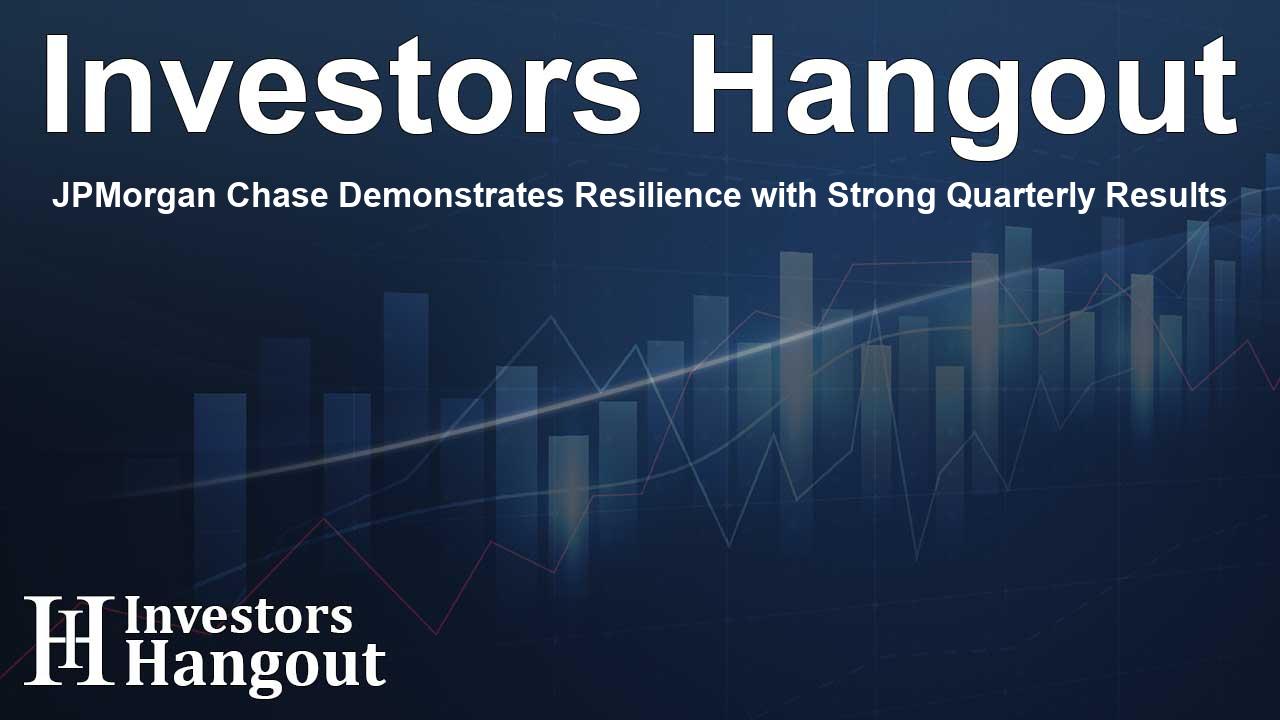JPMorgan Chase Demonstrates Resilience with Strong Quarterly Results

JPMorgan Chase Performance Overview
JPMorgan Chase, the largest bank in the nation, has made headlines recently with its impressive quarterly performance. After raising its dividend earlier this year, the bank continued to impress investors with its latest financial results, kicking off the earnings season with a solid presentation that surpassed many expectations.
Despite a notable downturn in revenue and profits when compared to last year’s figures, the outcome still provided a mixed sentiment among investors. Stock performance showed slight variation, with shares gently declining at midday. The CEO of JPMorgan Chase, Jamie Dimon, underlined prevailing uncertainties in the economic landscape, reflecting the cautious optimism investors should maintain.
“The U.S. economy remained resilient in the quarter,” commented Dimon. “Although there are positive elements such as tax reform and deregulation, we must remain mindful of risks, including trade uncertainties and geopolitical tensions.”
Examining Financial Metrics
Diving deeper into the bank's financial metrics reveals that the figures may not paint the whole picture. For example, in Q2, JPMorgan Chase reported a revenue of $45.7 billion, which may appear unimpressive due to a 10% year-over-year decrease, yet it surpassed the anticipated $44.1 billion.
Net income saw a decline of 17% year-over-year reaching $15 billion, but there was a slight increase of 2% from the first quarter. A major factor contributing to this uptick was the reduction in credit loss provisions, hinting at a more optimistic economic outlook.
Notably, earnings per share settled at $5.24, a decrease from last year’s results but still exceeding projections. This highlights the bank's resilience amidst challenges in the broader economic environment and showcases its adaptability.
Segment Analysis: Where Growth Lies
Breaking down the revenue segments reveals promising insights. The consumer banking segment generated $18.8 billion in revenue, boasting a 6% increase year-over-year. Factors like a significant jump in credit card and auto lending contributed greatly, with a revenue increase of 15% in that area.
Meanwhile, investment banking showed a robust performance with revenues climbing to $19.5 billion, marking a 9% increase from a year ago. This segment also enjoyed a boost from trading activities, solidifying JPMorgan’s stronghold in the investment sector.
Asset and wealth management reported a remarkable growth trajectory as well. With revenue rising to $5.7 billion, this segment thrived thanks to thriving equity markets, which enhanced both asset levels and fee income.
Dividend Increase and Shareholder Returns
As a testament to its consistent profitability and strong balance sheet, JPMorgan Chase announced plans to raise its dividend again this year. Starting in the third quarter, the new dividend will be set at $1.50 per share, a notable increase reflecting the bank's commitment to returning value to its shareholders.
Previously, the dividend was raised from $1.25 to $1.40, indicating a trend of increasing shareholder returns. The bank aims to maintain shareholder confidence, especially in uncertain times, thanks to its strong capital reserves.
Dimon elaborated on this by stating, “We’re proud to announce our cumulative dividend increase, which reflects our robust financial standing.” He also noted that the bank repurchased $7 billion in common stock, further emphasizing its commitment to maintaining a sound capital structure.
Final Thoughts on Investment Potential
Despite a slight dip on the stock market following the earnings announcement, JPMorgan Chase has showcased a solid 20% return year-to-date, along with a 36% boost over the past year. With a price-to-earnings ratio hovering around 14, the bank presents itself as an enticing investment opportunity.
The median price target among analysts stands at $302.50, suggesting there’s still significant potential for growth. Investors are keen to observe how JPMorgan Chase navigates the upcoming quarters amidst both challenges and opportunities that may arise in the financial landscape.
Frequently Asked Questions
What are the key financial highlights from JPMorgan Chase's recent earnings?
JPMorgan Chase reported a revenue of $45.7 billion and a net income of $15 billion, showcasing resilience despite a year-over-year decline.
How did the different segments perform during the last quarter?
The consumer banking segment increased by 6%, investment banking grew 9%, and asset management surged 10%, indicating diverse strengths across the bank's operations.
What dividend increase did JPMorgan Chase announce?
The bank announced a dividend increase to $1.50 per share for the third quarter, showcasing its commitment to returning value to shareholders.
What is JPMorgan Chase's stock performance year-to-date?
The stock has demonstrated a 20% return year-to-date, coupled with a considerable 36% increase over the past year.
How is JPMorgan Chase positioned in the market compared to its competitors?
With a P/E ratio of 14 and a strong financial structure, JPMorgan continues to be viewed as a valuable investment opportunity compared to its peers in the financial sector.
About The Author
Contact Kelly Martin privately here. Or send an email with ATTN: Kelly Martin as the subject to contact@investorshangout.com.
About Investors Hangout
Investors Hangout is a leading online stock forum for financial discussion and learning, offering a wide range of free tools and resources. It draws in traders of all levels, who exchange market knowledge, investigate trading tactics, and keep an eye on industry developments in real time. Featuring financial articles, stock message boards, quotes, charts, company profiles, and live news updates. Through cooperative learning and a wealth of informational resources, it helps users from novices creating their first portfolios to experts honing their techniques. Join Investors Hangout today: https://investorshangout.com/
The content of this article is based on factual, publicly available information and does not represent legal, financial, or investment advice. Investors Hangout does not offer financial advice, and the author is not a licensed financial advisor. Consult a qualified advisor before making any financial or investment decisions based on this article. This article should not be considered advice to purchase, sell, or hold any securities or other investments. If any of the material provided here is inaccurate, please contact us for corrections.
